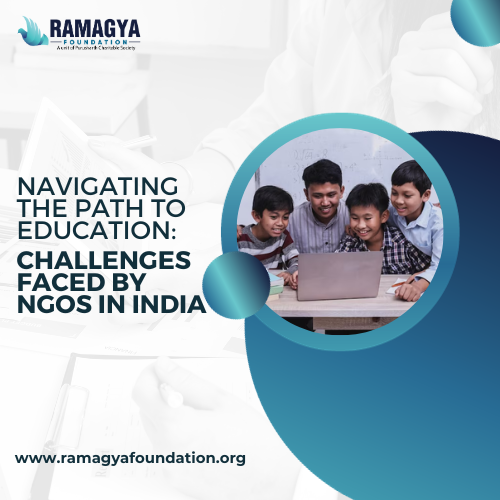 In a country as diverse and dynamic as India, education is a powerful tool for transformation, and education NGOs play a pivotal role in this journey. Organizations like the Ramagya Foundation have been making substantial contributions to education in India. However, they often grapple with many challenges that can make their noble mission a steep uphill climb. In this blog, we will explore some common challenges education NGOs face, particularly those in India, emphasizing the need for collective effort and innovation to ensure a brighter future for all.
In a country as diverse and dynamic as India, education is a powerful tool for transformation, and education NGOs play a pivotal role in this journey. Organizations like the Ramagya Foundation have been making substantial contributions to education in India. However, they often grapple with many challenges that can make their noble mission a steep uphill climb. In this blog, we will explore some common challenges education NGOs face, particularly those in India, emphasizing the need for collective effort and innovation to ensure a brighter future for all.
Challenge 1: The Funding Dilemma
As an education NGO in India, the Ramagya Foundation understands funding challenges. Education projects require substantial financial resources for infrastructure, quality teaching, and necessary materials. Many NGOs rely on donations and grants, which can be unpredictable and insufficient for their ambitious goals.
To address this challenge, education NGOs must diversify their funding sources. Collaborating with corporations, reaching out to philanthropic individuals, and organizing fundraising events can effectively secure the necessary funds. Financial transparency and accountability play crucial roles in maintaining trust with donors.
Challenge 2: Reaching the Unreachable
One of the fundamental tasks for education NGOs is reaching out to those in need, especially in remote and underserved areas. With a vast and varied demographic, India poses unique challenges in terms of accessibility and inclusivity. The Ramagya Foundation understands that its programs must extend beyond urban centers and into rural communities.
To tackle this issue, education NGOs need to implement innovative outreach strategies. Mobile education units, online resources, and partnerships with local community leaders can bridge the gap and make quality education accessible to even the most remote areas. Leveraging technology can also enhance the effectiveness of outreach efforts.
Challenge 3: Sustainability and Long-Term Impact
Sustainability is a critical concern for education NGOs. Initiatives and projects that are not sustainable run the risk of leaving students and communities hanging when funding dries up. The Ramagya Foundation realizes that its programs must have a lasting impact for long-term success.
Education NGOs must focus on capacity building and community involvement to address this challenge. They should train local teachers and community members to continue educational initiatives independently. Building partnerships with government bodies and local businesses can also contribute to program sustainability.
Challenge 4: Red Tape and Bureaucratic Hurdles
In India, navigating the complex web of regulations and approvals can be a daunting challenge for education NGOs. The Ramagya Foundation understands that bureaucracy can stifle progress and hinder the speedy execution of projects.
To overcome this obstacle, NGOs must deeply understand the local legal and administrative landscape. Establishing constructive relationships with local authorities and proactively addressing potential bureaucratic hurdles can ease the way. NGOs can also advocate for policy changes that streamline the approval process for educational initiatives.
Challenge 5: Quality Assurance and Accountability
Ensuring the quality of education provided is a primary concern for education NGOs in India. Quality assurance and accountability are essential to creating an impact that transforms lives. The Ramagya Foundation is committed to maintaining high standards in education.
To tackle this challenge, NGOs should continuously monitor and evaluate their programs. They can introduce standardized testing and assessment tools to measure students’ progress. Regular teacher training and involvement of educational experts can maintain and enhance the quality of education provided.
Challenge 6: Community Engagement
Education is not a one-way street. For it to be truly effective, it requires active involvement from the community. The Ramagya Foundation understands the importance of community engagement.
Education NGOs should foster a sense of ownership and involvement among community members. Organizing parent-teacher meetings, community events, and awareness campaigns can enhance the connection between the educational institution and the local community.
Conclusion
In conclusion, education NGOs in India, like the Ramagya Foundation, face several challenges that demand creative solutions. While these challenges may seem daunting, they are not insurmountable. By diversifying funding sources, embracing innovative outreach strategies, focusing on sustainability[1], addressing bureaucratic hurdles, ensuring quality education, and promoting community engagement, NGOs can overcome these obstacles and impact education in India. The road ahead may be challenging, but with determination and innovation, education NGOs can continue to make a significant difference in the lives of countless students nationwide.